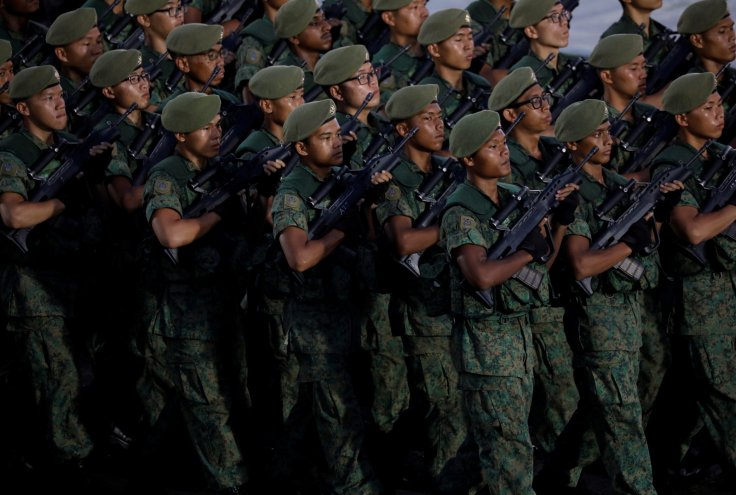
SINGAPORE — For the first time, Singapore is set to provide combat training in Iraq, with troops from the Singapore Armed Forces (SAF) helping to train Iraqi Security Forces to counter improvised explosive devices, and impart skills in tactical weapons and combat tactics, Defence Minister Ng Eng Hen announced on Friday (March 2).
This is part of the SAF's move to deploy more boots on the ground in Iraq later this year to support international efforts to combat terrorism, Dr Ng said during the debate on his ministry's budget in Parliament.
Since November 2014, the SAF has deployed planners, liaison officers, intelligence fusion officers, imagery analysis teams, and the Air Force's KC-135R tanker aircraft for use against the terror group, Islamic State (IS).
Medical teams from the SAF have also been deployed to the Middle Eastern country to provide healthcare support to coalition forces contributing to counter-IS efforts there.
While the United States-led multinational coalition has wrested Iraq back from IS control, Dr Ng said that US Defence Secretary James Mattis had asked Singapore to "commit more resources for the next phase of consolidation after our hard-won victories".
"The Cabinet has approved (that) Singapore maintain our commitment to counter terrorism globally for our own interests," Dr Ng said.
Soldiers deployed to Iraq will carry out the training in a "secured base camp", a spokesperson for the Defence Ministry told TODAY.
Member of Parliament Pritam Singh from the Workers’ Party raised questions over the deployment, including Mindef’s assessment of the threat to troops, the length of their deployment, and the size of the team.
Responding, Dr Ng said that while the risks were ever-present, troops are despatched only when the “risks are necessary to protect Singaporeans and Singapore”.
“Whether we send them to Afghanistan, to Iraq, to the Gulf of Aden, even when we send them to Timor Leste for peacekeeping operations, we have casualties. We do this because at the core, we’re protecting Singapore’s interests,” he added.
For every SAF mission, a needs and threat assessment team comes up with an assessment after speaking to commanders, and mapping the terrain and risks on the ground. “You can minimise (the risks) but you can never completely eliminate it,” said Dr Ng.
On troop safety, the minister cited his trip to Iraq last year to visit SAF soldiers. He was satisfied that “to the extent possible”, perimeter protection was in place and measures to respond will be taken if an incident crops up. On when Singapore can “pull back”, Dr Ng acknowledged that he does not know.
“For us to not continue to contribute when the most significant gains have been in actually taking back Iraq, I think it’s not within our character,” he said.
At home, the minister said that in the space of a year, the SAF has trained 18,000 servicemen for counter-terrorism operations at the Island Defence Training Institute, which was inaugurated in July last year.
Servicemen from the SAF and the police will also conduct routine joint training, Dr Ng disclosed.
The SAF and the police's Frontline Policing Training Centre will team up and arm soldiers with counter-terror skills.
In the region, Dr Ng noted the need to work with neighbouring ASEAN countries on such efforts, especially with the rising risk of foreign fighters leaving Iraq and Syria.
The minister reiterated that Singapore remains open to allowing the Philippine Special Operations Command, which was here last December for a professional exchange, to use its unmanned aerial vehicles for surveillance.
Among other things, Singapore also stands ready to join in patrols of the Sulu Sea, an area bounded by the Malaysian state of Sabah and southern Philippines. It previously offered to take part in trilateral patrols — involving Indonesia, Malaysia and the Philippines — to beef up maritime security and disrupt illegal smuggling in the waterway.
Apart from terrorism issues, Dr Ng also delved into cyber threats, which he said had "effects that could be as devastating as physical attacks".
Senior leaders in Defence Ministry (Mindef) and SAF, as well as departments handling sensitive information, have been "deliberately targeted" by spear-phishing attempts, he said. These refer to innocent-looking email messages that contain malicious software.
"They have not succeeded, but they will keep trying," he added, noting that attacks are carried out by everyone from freelancers to organised state and non-state actors.
Mindef, which has a "multi-layered" approach towards cyber defence, has taken steps to address this, including physically separating sensitive systems from the Internet.
The recently concluded bug bounty programme it organised — the first for a government agency here — had invited "white-hat" hackers to probe its systems. This led to 35 vulnerabilities being uncovered, two of high severity.
In another announcement, Dr Ng said that Mindef will take in the first batch of full-time national servicemen (NSFs) under the Cyber NSF Scheme this year. The scheme will train NSFs as cyber operators, to conduct threat monitoring and assessment.
The ministry announced last month that Singaporeans and permanent residents enlisting in National Service in the second half of this year may apply.
Selected NSFs with higher aptitude and skills in cyber security will be offered the Cyber Specialist Award, a short-term contract of three or four years that will also include their full-time National Service stint.
Last February, Mindef was dealt its first cyber-security breach where the personal details of 850 national servicemen and staff members were stolen.
https://www.todayonline.com/singapo...-security-forces-countering-explosives-combat
